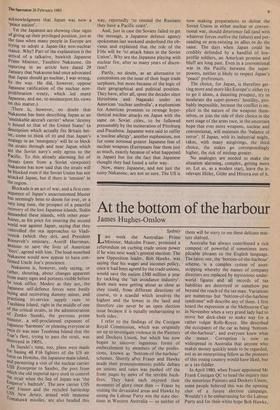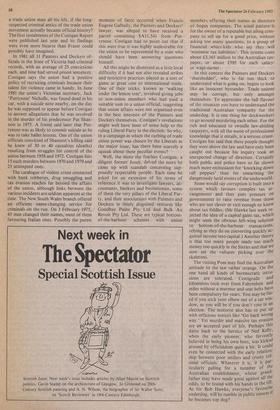At the bottom of the harbour
James Hughes-Onslow
Sydney
Last week the Australian Prime Minister, Malcolm Fraser, promised a referendum on curbing trade union power if he wins next week's general election. The new Opposition leader, Bob Hawke, was saying that his wages and incomes policy, once it had been agreed by the trade unions, would save the nation £500 million a year by tackling the lax avoidance industry'. Both men were getting about as close as they could, from different directions of course, to a scandal which involves the highest and the lowest in the land and therefore can never be an open election issue because it is equally embarrassing to both sides.
refer to the findings of the Costigan Royal Commission, which was originally set up to investigate violence in the Painters and Dockers Union, but which has now begun to uncover ingenious forms of embezzlement by members of the profes- sions, known as 'bottom-of-the-harbour' schemes. Shortly after Fraser and Hawke made their pronouncements public debate on unions and taxes was pushed off the front pages by news of the terrible bush- fires. They have each enjoyed their moments of glory since then — Fraser by visiting the devastated areas and Hawke by seeing the Labour Party win the state elec- tions in Western Australia — so neither of them will be sorry to see these delicate mat- ters shelved.
Australia has always contributed a rich compost of powerful if sometimes inex- plicable phrases to the English language. The latest one, the 'bottom-of-the-harbour' scheme, is a complex system of asset- stripping whereby the names of company directors are replaced by mysterious under- world figures and all records of tax liabilities are destroyed or somehow put beyond the reach of the tax man. Variations are numerous but 'bottom-of-the-harbour syndrome' will describe any of them. I first heard the expression at the Melbourne Cup in November when a very grand lady had to move her deck-chair to make way for a rather vulgar Rolls-Royce. She described the occupants of the car as being 'bottom- of-the-harbour', and everyone knew what she meant. Corruption is now so widespread in Australia that anyone who makes money quickly tends to be regarded, not as an enterprising fellow as the pioneers of this young country would have liked, but as a tax-fiddler.
In April 1980, when Fraser appointed Mr Frank Costigan QC to head the inquiry into the notorious Painters and Dockers Union, some people believed this was the opening shot of a future election campaign. Wouldn't it be embarrassing for the Labour Party and for their white hope Bob Hawke,
a trade union man all his life, if the long- suspected criminal antics of the trade union movement actually became official history? The first instalments of the Costigan Report were published last year and its findings were even. more bizarre than Fraser could possibly have imagined.
In 1981 all 11 Painters and Dockers of- ficials in the State of Victoria had criminal records, with an average of 23 convictions each, and nine had served prison sentences. Costigan says the union had a positive policy of recruiting criminals because their talent for violence came in handy. In June 1981 the union's Victorian secretary, Jack Puttynose' Nicholls, was found dead in his car, with a suicide note nearby, on the day he was supposed to appear before Costigan to answer allegations that he was involved in the murder of his predecessor Pat Shan- non in 1973. A friend said later that Put- tynose was as likely to commit suicide as he was to take ballet lessons. One of the union officials convicted of Shannon's killing said he knew of 30 or 40 casualties (deaths) resulting from struggles for control of the union between 1958 and 1972. Costigan lists 15 such murders between 1970 and 1979 and 23 attempted ones.
The catalogue of violent crime connected with bank robberies, drug smuggling and tax evasion reaches far beyond the affairs of the union, although links between the various incidents are seldom apparent at the time. The New South Wales branch offered an efficient name-changing service for criminals on the run. On 3 February 1975, 43 men changed their names, most of them favouring Italian ones. Possibly the purest moment of farce occurred when Francis Eugene Galbally, the Painters and Dockers' lawyer, was alleged to have received a parcel containing $A11,541 from Put- tynose. Costigan had to point out that if this were true it was highly undesirable for the union to be represented by a man who should have been answering questions himself.
All this might be dismissed as a little local difficulty if it had not also revealed strikes and restrictive practices played as a sort of game at great cost to international trade. One of their tricks, known as 'walking Under the lemon tree', involved giving jobs to non-union members who had paid a suitable sum to a union official, suggesting that union affairs were not organised even in the best interests of the Painters and Dockers themselves. Costigan's revelations might well have been of some help to the ruling Liberal Party in the election. So why, in a campaign in which the curbing of trade union power was chosen by the Liberals as the major issue, has there been scarcely a squeak about these peculiar events?
Well, the more the fearless Costigan, a diligent former Jesuit, delved the more he came up with scandals concerning sup- posedly respectable people. Each time he asked for an extension of his terms of reference it was to investigate lawyers, ac- countants, bankers and businessmen, some of them the very pillars of the Liberal Par- ty, and their associations with Painters and Dockers in thinly disguised ventures like Goodbye Paine Pty Ltd and Bulk Au Revoir Pty Ltd. These are typical bottom- of-the-harbour schemes with union members offering their names as directors of bogus companies. The usual pattern is for the owner of a reputable but ailing com- pany to sell up for a good price, without asking too many questions, to a group of financial whizz-kids who say they will 'minimise tax liabilities'. This system costs about £3,165 million to the Australian tax- payer, or about £595 for each salary- or wage-earner.
In this context the Painters and Dockers 'shareholder', who is far too thick to understand what is going on, begins to look like an innocent bystander. Trade unions may be corrupt, but only amongst themselves. To appreciate the full flavour of the situation you have to understand the traditional Australian sympathy for the underdog. It is one thing for dockworkers to go around murdering each other. For the rich and educated to swindle law-abiding taxpayers, with all the waste of professional knowledge that it entails, is a serious crime. Costigan has said that these people thought they were above the law and have only been caught out because his inquiry took an unexpected change of direction. Certainly both public and police have so far shown much more enthusiasm for 'knocking down tall poppies' than. for unearthing the dangerously lurid events of the underworld.
Some would say corruption is built into a system which favours complex tax ar- rangements and thus puts pressure on governments to raise revenue from those who are not clever or rich enough to know about tax fiddles. (Mr Hawke last week re- jected the idea of a capital gains tax, which might seem the obvious left-wing solution to bottom-of-the-harbour transactions, relying as they do on converting quickly ac- quired income into capital.) Another theory is that too many people made too much money too quickly in the Sixties and that we now see the vultures picking over the skeletons.
The visiting Porn may find the Australian attitude to the law rather strange. On the one hand all kinds of bureaucratic intru- sions are tolerated. Centigrade and kilometres took over from Fahrenheit and miles without a murmur and seat-belts have been compulsory for years. You may be fin- ed if you stick your elbow out of a car win- dow, as you will be if you don't vote in an election. The motorist also has to put up with officious notices like `Go back wrong way.' Yet murder and massive tax evasion are an accepted part of life. Perhaps this dates back to the heroics of Ned Kelly, when the early pioneer, who fervently believed in being his own boss, was kicked around by officialdom quite a bit. It could even be connected with the early relation- ship between poor settlers and crusty col- onial officials. Whatever it is, it is par- ticularly galling for a member of the Australian establishment, whose grand- father may have made good against all the odds, to be found with his hands in the till. As for Bob Hawke, everyone's favourite underdog, will he tumble in public esteem if he becomes top dog?











































 Previous page
Previous page